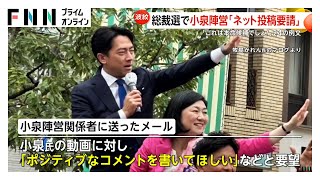Koizumi Camp Under Fire Over Online Posts

Koizumi, 44, expressed deep regret over a recent controversy linked to his campaign communications. He stated, “If I had been stronger and more responsible, this situation would not have arisen. I deeply regret causing concern.”
The apology followed revelations that the office of former Digital Minister Karen Makishima, who served as head of Koizumi’s campaign communications, had emailed campaign affiliates requesting positive comments on videos featuring Koizumi. According to party sources, the email included 24 example comments.
These ranged from enthusiastic endorsements such as:
– “No doubt he’ll be the next president.”
– “This is the real frontrunner.”
– “At last the star has arrived.”
– “The essence of the conservative LDP shines through.”
There were also appeals aimed at rallying support:
– “Give us reason to hope in the LDP again.”
– “Please rebuild the party.”
Other comments praised Koizumi’s appearance and performance:
– “His expression seems different—more refined than last year.”
– “Impressive that he persuaded Ishiba.”
Some of the suggested comments appeared to target rival candidate Sanae Takaichi, urging readers to resist “pseudo-conservatives for business interests,” and emphasizing the need for “someone who works earnestly without showmanship” and “the importance of allies in policymaking.”
On September 26th, Koizumi admitted to the facts but denied personal involvement. However, he apologized sincerely:
“The office acted on its own in circulating reference examples. While I understand the intention was simply to spread supportive messages, some expressions went too far. I did not know about it myself, but as this concerns the leadership election, I accept responsibility. Criticism should be directed at me. I will ensure there is no repeat and will continue this race with full discipline.”
Koizumi’s team has worked to downplay the controversy, arguing that “asking supporters to write encouraging comments is not inherently problematic” and seeking to bring closure after the public apology.
Takaichi’s camp, however, responded angrily. One lawmaker wrote on social media, “This is a serious matter that undermines the integrity of the leadership election.”
On the same day, election management committee chair Hiroshi Aisawa emphasized the importance of energizing the leadership race through social media but urged campaigns to avoid inflaming confrontations between camps.
Karen Makishima herself issued a statement acknowledging responsibility:
“Due to my lack of oversight, some of the suggested phrases contained inappropriate expressions. I sincerely apologize.”
Political commentator Hideo Yanagisawa noted that the phrases had the flavor of “modern catchphrases, some of which may seem questionable,” and cautioned viewers not to take such posts at face value.
“In the world of online politics, regulation is difficult. It’s important that people who receive such messages remain discerning and not accept everything uncritically,” he said.
https://newsonjapan.com/article/147042.php







